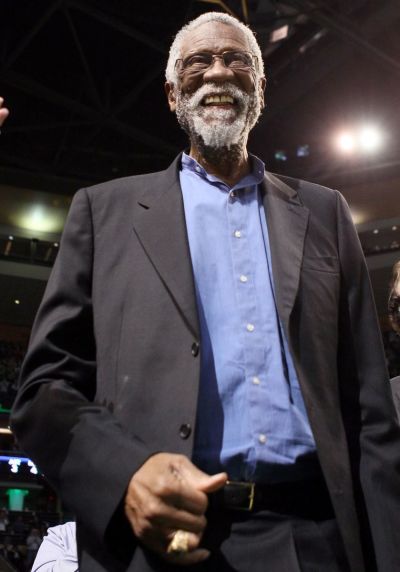Bill Russell, Jackie Robinson and civil rights

The world lost a giant recently when Bill Russell, the all-star center who led the Boston Celtics to 11 NBA championships during his playing career from 1956 to 1969, died. Only Wilt Chamberlain had more career rebounds than Russell who revolutionized the center position by his phenomenal ability to block shots. The 6’10” basketball star was also the first black head coach in any major American sports league. But Russell was a giant off the court as well. Following in the footsteps of Jackie Robinson, Russell helped blaze a trail that many other professional athletes have followed. Russell told a journalist, if “it hadn’t been for Jackie, he might not have become a professional basketball player.”
For more than six decades, Russell participated in the civil rights struggle, using his platform as a celebrity athlete to work to end racism. Along with baseball players Bill White, Curt Flood, and Bob Gibson, Russell led a group of black athletes who in the 1960s risked their reputations and livelihoods to challenge segregation and discrimination.
Russell, like Robinson, joined Martin Luther King Jr. in the March on Washington for Jobs and Freedom in 1963. That year Russell also staunchly supported demonstrations to end segregation in Boston public schools and spoke to black students participating in a sit-in. After the assassination of civil rights leader Medgar Evers also in 1963, Russell offered his help to Evers’ older brother, Charles who lived in Jackson, Mississippi. In response to Evers’ suggestion, Russell operated an integrated basketball camp in the Deep South despite the danger to his life.
Although blacks began playing in the NBA in 1950, few of them were playing in the mid-1950s. Russell was the only black player on either team in the NBA championship series his rookie season. Like Robinson, he endured racist taunts while playing. Like the baseball pioneer, he also sometimes faced discrimination in accommodations and dining. When a hotel restaurant in Lexington, Kentucky, where the Celtics had come to play an exhibition game in 1961, refused to serve the Celtics’ black players, Russell led them in a strike.
Like Robinson, Russell also faced discrimination in housing. In the mid-1950s, racism prevented the Robinsons from buying a home in Westchester, New York, and hampered their attempt to purchase property in North Stamford, Connecticut. After the Robinsons built a home in an all-white neighborhood in North Stamford in 1955, numerous whites complained. The man who sold the property to the Robinsons was ostracized, and several families on the block sold their houses. After vandals spray-painted racial epithets on the wall of his house in Reading, Massachusetts, Russell tried to move his family to another house nearby, but residents of the predominantly white neighborhood devised a petition to prevent them from doing so.
Many view Robinson’s primary contribution to civil rights as his breaking of the long-standing color barrier in Major League Baseball. But Robinson arguably broke more barriers after retiring from baseball than he did as a player. In remembering her husband, Rachel Robinson emphasizes his role “as an informal civil rights leader. That’s the part [of his legacy] people forget.” Jackie, she adds, used his athletic success “as a political forum” to promote the causes about which he cared. Robinson called himself a one-man “pressure group for civil rights.”
Motivated by his Christian faith, Robinson became a major civil rights spokesperson and activist during the last 16 years of his life. His biographer Michael Long contends that Robinson was “an extraordinary political powerhouse and a civil rights leader ... who personified the ‘first class citizenship’ that he demanded for all Americans.” As political scientist Peter Dreier argues, Robinson was a pathbreaker in social and political activism; he was one of a handful of professional athletes who have gone beyond philanthropy and social service to challenge social institutions and practices through their words and deeds. “The scale, depth, and variety of Robinson’s activism,” Dreier asserts, is “so remarkable that it would be almost impossible to replicate.”
Robinson served as the national chair of the NAACP’s Freedom Fund Campaign, worked with the National Conference of Christians and Jews, helped lead several civil rights marches, wrote columns on racial issues for the New York Post and the New York Amsterdam News, gave dozens of speeches and sermons, and labored energetically to provide better schools, housing, and jobs for African Americans. In interviews on numerous national television and radio talk shows and in hundreds of newspaper columns, Robinson analyzed varied civil rights issues and challenged the views of black and white politicians and activists including Adam Clayton Powell Jr., Roy Wilkins, Malcolm X, Dwight Eisenhower, John F. Kennedy, Richard Nixon, Ronald Reagan, and William Buckley.
The baseball star wrote dozens of letters to presidents both criticizing and applauding their civil rights policies. He journeyed to many of the South’s hotspots, spoke in Birmingham, Alabama, and marched at Selma, Alabama. Robinson participated in protest events in the nation’s capital and in New York City and convinced other prominent black athletes to join him at civil rights events.
As we celebrate the lives of Bill Russell and Jackie Robinson, whose museum opened last week in New York City, let us remember not only their impressive athletic accomplishments but also their major contributions to the civil rights movement. Putting themselves in personal danger (both men received numerous death threats), they courageously confronted animosity, hostility, and racism to enhance the opportunities of black Americans. Inspired by their heroic actions, countless other black athletes have fought to end discrimination in sports and other areas of American society.
Originally published at The Institute for Faith and Freedom.
Dr. Gary Scott Smith is a Professor of History Emeritus at Grove City College and is a fellow for faith and politics with the Institute for Faith and Freedom. He is the author of the forthcoming Strength for the Fight: The Life and Faith of Jackie Robinson.




























